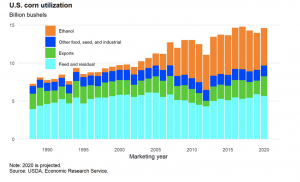Reuters reported Tuesday that "the top U.S. oil and corn industry lobby groups said on Tuesday they were suing the administration of President Joe Biden over its plans to slash…
U.S. Supreme Court Hears Case on Biofuel-Blending Waivers
Bloomberg writer Jennifer A Dlouhy reported earlier this week that, “A long-running clash between gasoline and ethanol producers will be before the U.S. Supreme Court on Tuesday, in a case that could cost small oil refineries hundreds of millions of dollars.
At issue is the ability of refineries to win exemptions from 16-year-old U.S. government mandates that they mix renewable fuels into gasoline and diesel.
Ms. Dlouhy explained that, “Under former President Donald Trump, the Environmental Protection Agency let dozens of small refineries off the hook. Though the Biden administration is set to change course, a high court ruling limiting refinery waivers would remove its discretion.
“Such a ruling could reverberate for years, ruling out expansive relief for refiners and potentially encouraging investment in the equipment needed to push more renewable fuels into the market.”
The Bloomberg article noted that, “Biofuel advocates challenged the surge [of exemptions] in federal court, arguing the waivers should be reserved only for refineries that have continuously secured extensions of their initial exemptions. The 10th Circuit Court of Appeals agreed in January 2020, finding the EPA had wrongly exempted refineries owned by HollyFrontier Corp. and CVR Energy Inc.’s Wynnewood Refining Co.
“The Supreme Court is now reviewing the 10th Circuit’s ruling that refineries should only be eligible if they initially received waivers and had them continually extended — an approach under which only a few nationwide would qualify.”
Politico writer Matthew Choi reported on Tuesday that, “HollyFrontier Corp. and Wynnewood Refining Co. argue the [10th Circuit’s] court’s decision is counter to Congress’ express intent that EPA be able to extend exemptions to small refineries ‘at any time,’ as long as they show that RFS requirements would burden them with disproportionate economic hardship, and upholding the waiver limits poses an ‘existential threat.’
“On the other side, a coalition of agriculture and biofuels groups argue the decision was a straightforward reading of the text and should be upheld.”
Refiners told SCOTUS today that #RINs & #RFS cause them to “go out of business.” But @EIAgov data show only 6 small refineries shut down since 2013 when RIN prices first gained value. 53 shut down from 1990-2012 when RINs were nonexistent or worthless! #Frivolous pic.twitter.com/hokDUF7sT3
— Renewable Fuels Association (@EthanolRFA) April 27, 2021
And later on Tuesday, Bloomberg writers Jennifer A. Dlouhy and Ellen M. Gilmer reported that,
Supreme Court justices signaled skepticism of assertions from small oil refineries that they should be allowed to extend lapsed waivers from mandates they use biofuels.
“Hearing arguments by phone Tuesday, the justices vigorously questioned contentions by two refining companies that Congress intended to create a long-term safety valve for gasoline and diesel makers otherwise required to blend plant-based fuels into their products.”
DTN writer Todd Neeley reported this week that, “The future of the small-refinery exemptions program likely will come down to the meaning of the word ‘extension‘ in the Renewable Fuel Standard. During oral arguments Tuesday, justices on the U.S. Supreme Court quizzed attorneys for the federal government, biofuels groups and refiners on how they interpret the word.
“Refining company HollyFrontier brought the question before the court this spring in an appeal of a ruling by the U.S. Court of Appeals for the 10th Circuit in Denver in January 2020.”

Mr. Neeley noted that, “That court found EPA acted improperly when it granted exemptions to three small refiners, including HollyFrontier, because they had not received exemptions in previous years.
“An eventual ruling by the Supreme Court is likely to determine how EPA grants similar exemptions going forward.”







